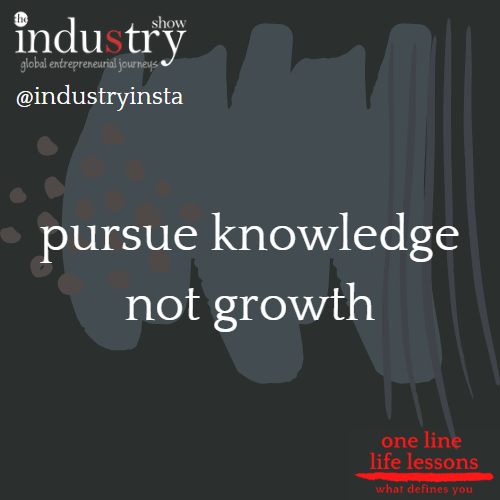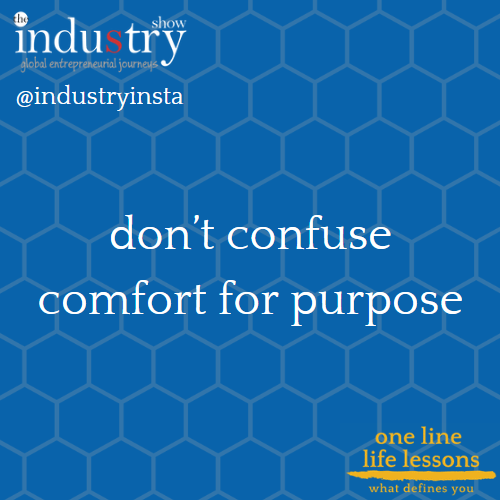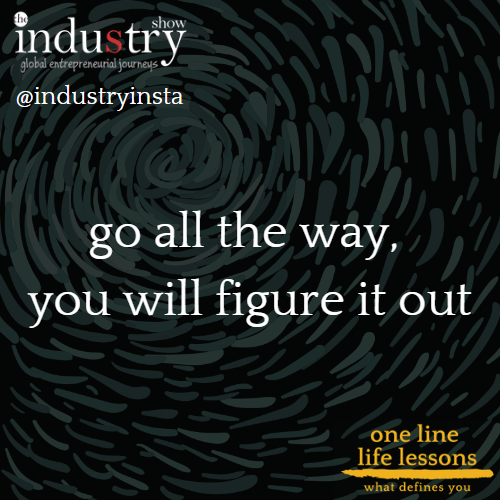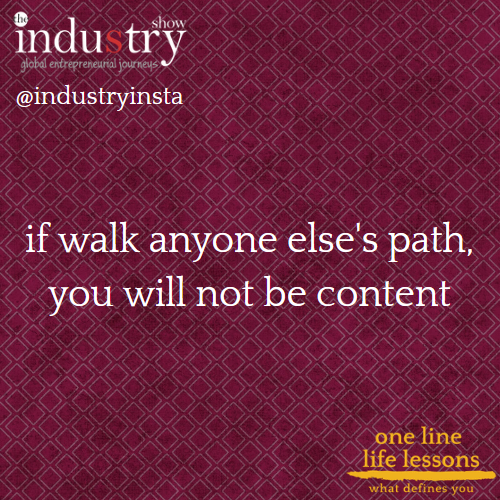oct 29, 2022
Mona Akmal
Mona Akmal is the CEO and Co-founder of Falkon – the first intelligence platform for the entire GTM team, including marketing, sales, and account management. Previously she held leadership positions at Microsoft, Amperity, Code.org, and Zulily.
One Line Life Lessons from Mona





Episode Highlights
- (0:00:00) – Nitin Bajaj welcomes Mona Akmal to the show
- (0:00:12) – Let’s talk about Falkon, a go to market intelligence platform
- (0:03:06) – Give us a sense of the size and scale. Where do you see Falkon and your team going from here
- (0:06:06) – As we talk about, I have two questions. One is the biggest challenge you’re facing
- (0:08:27) – What is one success that you’re proud of and then one failure
- (0:13:54) – Mona shares her one line life lessons
Show Transcript
Transcript - Full Episode
Nitin Bajaj: (0:00:00) – Welcome to the industry show. I’m your host, Nitin Bajaj. And joining me today is Mona Akmal. Mona, welcome on the show.
Mona Akmal: (0:00:08) – Thank you so much, Nitin. It’s great to be here.
Nitin Bajaj: (0:00:10) – Pleasure is all ours. So let’s start with who is Mona?
Mona Akmal: (0:00:15) – Who is Mona? Mona is a libra who loves cats and dogs, grew up in Pakistan, likes solving hard problems, and only exists in outlier feelings, either very high or very low. No in betweens.
Nitin Bajaj: (0:00:33) – Love that. Love the extremities. Let’s talk about Falkon. Tell us, what is it? What’s the mission, the vision? And after that, we’ll talk about why do this? And now.
Mona Akmal: (0:00:49) – Yeah, for, you know, I’ve had the privilege of most of my career being in tech companies. And actually, the inspiration for Falkon did not come from any of them. It came from my time at Zulily, which was a retail company. And what I observed at Zulily was it was the only place I’d ever worked where data was actually being used to make decisions and drive customer experience every single day, and it was all automated. Every other company I’d worked at, all tech companies, our margins are infinite, so we don’t care about efficiency, and that’s why we write million dollar checks for Snowflake, and we collect data like there is no tomorrow. But our usage of it is predominantly to report on the business, not run the business. And we started Falkon with the mission to right size the ROI on data and then really went deep on one subset of data, because data at large is an unsolvable problem. And we focused on go to market data specifically. And the reason for that is revenue leaders. And go to market leaders have a level of binary success failure that very few other disciplines do, like product management. People don’t get fired because they launched a feature that didn’t do well, but ahead of sales will get fired if they miss their quota three quarters in a row. And that kind of simplicity actually really makes them highly amenable to new ways of doing work, new ways of using their data and making better decisions. And that’s why we ended up focusing on go to market. So Falkon is a go to market intelligence platform. We join all go to market data across marketing, sales, product usage, and customer success, and help go to market teams come together instead of working in silos and hopefully work in a data driven way instead of just guesswork and golf.
Nitin Bajaj: (0:02:53) – Tough challenge, tough nut to crack, but we know we need it. This is like medication, 100%.
Mona Akmal: (0:03:00) – And the reason for doing this is because it’s tough and that keeps it interesting.
Nitin Bajaj: (0:03:06) – So true. Give us a sense of the size and scale. You’ve been at it just over a couple of years now. What’s the impact you’re driving and where do you see Falkon and your team going six to twelve months from here?
Mona Akmal: (0:03:22) – Yeah, so we started the company a month before COVID started, which couldn’t have picked a better time. And we raised our seed round from Greylock and that took us through the first two years of the company. We actually started as an augmented analytics company and had to pivot our way into being a go to market intelligence company, applying the same tech but to a subset of the data. And fast forward to now. We’ve just raised our Series A, led by omers $16 million. And now we are essentially growing the business. Now that we feel we have a product that solves a real problem. We have 17 to 20 annually contracted customers. I don’t consider a customer a customer if they are not paying us money. There’s probably an unpopular opinion in the startup world, but call me old fashioned. And the impact that we’ve been able to deliver for our customers is often they will see rep, productivity will go up, their win rates will increase by 10% to 15%, return on marketing spend will go up. And being a numbers oriented team, we really measure our own impact in the metrics that we can move. And the plans for the company now are really to transition from a founder led sales model and me knocking on doors to building our own go to market team out. We just hired our head of marketing. We will be hiring our head of sales soon. So where I expect us to be as a company is to scale from 20 to 100 customers in the next twelve months and prove out our own unit economics.
Nitin Bajaj: (0:05:08) – That’s amazing. Congratulations on the successes so far. This is a tough market to raise funding and you’ve successfully done that. And I think the time we have right now, people will be prudent to look at data to make sound decisions. So I see the rocket ship taking off from here on.
Mona Akmal: (0:05:31) – Thank you so much. And everyone’s worried about the bear market and the tech meltdown that happened. I have personally been quite happy about it because growth at all costs has stopped being the marching order. And thinking about unit economics and net revenue retention and efficiency has come to the forefront, which is where we shine. And so for us, this is posing amazing opportunity instead of a recession.
Nitin Bajaj: (0:06:05) – It’s awesome. As we talk about, I have two questions. One is the biggest challenge you’re facing. On the other end, the biggest opportunity take your pick on what you want to go with first because we did start talking about the opportunity, but I’ll let you answer both of those questions.
Mona Akmal: (0:06:25) – Yeah. So I think the biggest challenge we’re facing, I would say, is a natural one that startups go through. Right. If you are doing your job right, your company looks very different every six months. Right. We just hit 30 people at the company. So internally, all the processes that were working six months ago have stopped working and it’s just pure madness and chaos. We’ve moved into a new office. Our daily stand ups have to break up now because the whole company can’t possibly fit into one room. And so I think our biggest challenge right now is to grow the company and evolve our processes internally so we can continue to move super fast. But with more people in the boat than there were before, I think the biggest opportunity we see is when we were fundraising. The biggest piece of advice or concern that we heard was, you guys are the best product on the market that no one has ever heard of. Because we’re a product focused company. And actually, a lot of times in the go to market space, the founders have a sales or marketing background and so they create a lot of hype and you know a lot about them even before they have a product that does anything. And we still don’t have a product designer, but our product is like a Ferrari. Right. And so for us, the biggest opportunity is to really showcase the world, what we’ve built, and how special it is. And we’re going to do that with our marketing team and our sales team and our community.
Nitin Bajaj: (0:08:08) – That’s a pretty amazing opportunity. And also on the challenge, growing pains are a good problem to have. So as much as I empathize with that being a challenge, think it’s a good one, and nothing wrong with having that one.
Mona Akmal: (0:08:24) – Totally agree. 100% agree.
Nitin Bajaj: (0:08:27) – So as we look forward, let’s look back in the rear view mirror and talk about your career, your work that you’ve done with other startups and that led you to this point. What is one success that in your own books blew your mind and you’re super proud of? And then one failure, and using that f word that we don’t tend to use a whole lot in the startup community.
Mona Akmal: (0:08:56) – Yes.
Nitin Bajaj: (0:08:57) – What’s that one failure that became a lesson and has helped you in the work you’re doing now?
Mona Akmal: (0:09:03) – Yeah, those are both great questions. And for me, the list of failures is endless. So unfortunately, we don’t have enough time to get into all of them. I would say that the one success that I’m personally pretty proud of is I left Microsoft when the reputation of the company wasn’t great. Like, you weren’t particularly hireable if you were exiting Microsoft in those years. And I was considered a one trick pony. I had never worked anywhere else. I was very much Redmond born, Redmond raised. And when I went out in the market, spoke with a bunch of founders and ceos and they all gave me a pretty harsh critique that I didn’t know what Slack was and I didn’t know how to use Trello and my tool knowledge was outdated. And I was like this old dinosaur. And for the record, I was 31 years old and really sucks to be a dinosaur at 31. And there was a very strong desire to just go back, right and hide away. But I’m very proud that I not only did not do that, I jumped into code where there was no product manager at all, no head of engineering, and I had not been an individual contributor in, I don’t know, at least eight years prior to that. Then I rolled up my sleeves, I wrote all the specs, I ran the engineering team, I was our solo designer, our solo product manager, and in a year we were able to launch the hour of code. And the president of the United States did that. And that was such an amazing moment to see the frozen tutorial that me and my team had worked so hard on get used by 100 million kids and including the tallest kid of them all, President Obama, was amazing. So that was a success story. And I think the thing that that did for me was it gave me a lot of confidence that I can thrive in a new environment and I can learn, and that’s actually one of my superpowers. And somehow I’d forgotten that being at Microsoft for such a long time. And I think the one failure I would say, is for 1 second, this isn’t even on my LinkedIn profile. Maybe I should put it on because I talk about it all the time anyway, was from Microsoft. I went to Amazon and I left three weeks after I joined. And I am so glad for that failure because one, I realized that I was simply not following my path. I had changed. It was like living in one western european country and moving to another western european country and realizing, oh, they speak different languages, but they’re more similar than different. And so why am I doing that? What’s the point? And then really decided to commit to my path and go small. And that is where the code success came from. So that would be the big failure. And I think the big learning there was. If you’re going to do something, go all the way. Don’t do this shallow end of the pool at all. It does not work. Just jump into the ocean. Forget about the pool altogether. You’ll figure it out.
Nitin Bajaj: (0:12:53) – That’s such an amazing way to put both of those together. And first off, congratulations on that hour of code launch. Huge moment, and I’m glad the kids got to experience that and continue to do so. And then on the failure, I’m not sure that is a failure. I think it takes a lot of conviction to own up to, hey, this is not me. And that courage to walk away from something that you put in a lot of hard work to get into in the first place. And Amazon is no small company. And having that on your resume, that brand, that logo, could have gone in a different path in a different set of places. So kudos to you again, that I think it reminded you that you are the kind of jump in the ocean and figure it out person and has brought you to this place. So I’m really glad for your failure. And let’s use this opportunity to move into my favorite part of the show, which is the one line life lessons. Essentially drawing from these moments, these inspirations are role models, mentors, guides who have you and your own internal drive that brings you to these, what I call lessons that are simple but profound. And I found some of them to be life changing. And I would love for you to share those with us and our audience. So I’ll hand it over back to you.
Mona Akmal: (0:14:34) – Yeah. I think one very important life lesson I learned as an immigrant was, I’ll give you a couple. The first one was the first ten years of my adult life. I was living my parents dream, not my own. I think the first lesson as an adult was let go of the suitcases your parents hand you, the suitcases of expectations, put them down and take the time to figure out who you are and what you want. Very important, because as long as you keep walking your parents path or anyone else’s path, you’re not going to be content. Second lesson was, the right path is not the easy path, it’s not the comfortable path. And a lot of times I think we confuse comfort for purpose. It is not our purpose. In fact, often when you are on your real path, it’s really fucking hard. It is very challenging. There are many obstacles. And so that sort of second lesson is, don’t confuse comfort for purpose. They are very different. They actually feel very different. Third is knowledge and growth are not the same. Thing. Pursue growth, not knowledge. Growth mindset is like every person says, they have a growth mindset, right? And when I ask, okay, great, what have you learned recently? What have you grown in recently? They’ll tell me about, a book they’ve read, a podcast they’ve listened to, a country they’ve visited as a tourist, and all of that. That’s not growth. That’s acquiring knowledge. That is being a hoarder of information. Growth happens when you transform as a person. It becomes a part of your physiology and your psychology, and that only happens through doing things, not through listening or watching, not those senses. All senses have to be engaged for you to experience. And then last is pursue excellence, not happiness. I don’t believe in the pursuit of happiness. I don’t think there is any state that is happiness. I think there is joy, there is contentment, there is flow, there is focus, there’s depression, there’s anger. I don’t know happiness to be a real human emotion. Joy is very fleeting. People confuse that for happiness. If you start chasing joy, you might as well start taking hard drugs. It’s the same thing. That’s not a durable life. It’s like you’re asking for your fix, right? If you pursue excellence, you might live a difficult life, but when you look back, you’re going to be pretty fucking impressed with what you got done.
Nitin Bajaj: (0:17:52) – So true. Music to my ears, every single one of them. And quite a few of those. In fact, just this past weekend we were talking about how this pursuit of happiness has done more harm than good, specifically here in North America. And yeah, hopefully we can figure our way out of that and stop chasing something that, as you rightly put, is neither realistic nor a good goal to have. I’m really glad you say it as you feel it. I really enjoy people who can do that, and it’s even more appreciative doing that. As an immigrant, as a startup founder, and as a woman, I really appreciate those values in a person. And needless to say, thank you for taking time out and being with us to share your story, your journey, and congratulations for what you have achieved. But I know this is just the beginning and we’d love to stay in touch, bring you back on. You continue to add more zeros, not just to your own revenues, but to your clients as well.
Mona Akmal: (0:19:15) – Thank you so much, Nitin. It was such a pleasure being here, and I look forward to coming back and sharing more good news.
Nitin Bajaj: (0:19:22) – Likewise. Thank you so much, Mona.



